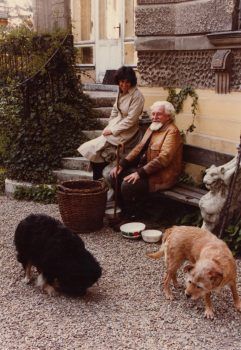by Joan Harvey
We are all the animals and none of them. It is so often said that poetry and science both seek truth, but perhaps they both seek hedges against it. —Thalia Field

A handsome bearded man leads a row of eager young ducklings who mistake him for their mother. Many of us recognize this image, warm and charming, gemütlich even, as that of ethologist, Konrad Lorenz. Thalia Field, in her book Bird Lovers, Backyard, in a section titled “A Weedy Sonata,” leads us to Lorenz the way I came to him, the way I remember him from childhood: “…the imprinting idea reveals this white-bearded man in work pants and waders, a row of ducklings strolling behind him….Picture: Konrad Lorenz on his steps, feeding a baby bird from a dropper. Martina the goose waiting to go up to sleep in ‘her bedroom’ at the top of his house. A family portrait in progress.”
Recently Leanne Ogasawara, in her 3 Quarks Daily essay on Leonardo’s painting Salvator Mundi, concludes that in evaluating the provenance of an Old Master, it is wisest to trust the scientists, a position with which I’m inclined to agree. But in the discussion that followed, others raised the need for a “fresh eye,” suggesting that artists and philosophers and laymen should weigh in for a more balanced view, one less prone to innate bias. Today, with more women in science, with research in neuroscience leading to an explosion in ideas about what consciousness is, with neuroscientists concluding that animals too are conscious, there is recognition that we have drawn false borders where there may be none. Previously agreed on methods and theories have been increasingly questioned both from within and without a number of fields. There is a general re-visioning of assumed truths, of the canon left by mostly white men. Of course the best science is always open to correction as more information becomes available.
My mother, a passionate animal lover, who often preferred animals to humans, and who had six kids in a row, somewhat as if she’d produced a litter, had Lorenz’s book, King Solomon’s Ring, on her shelf, though I no longer remember if she gave it to me to read, or I just found it myself. And what I remember, what everyone remembers from the book, is this man, embodying both the maternal and paternal, leading a flock of baby geese around, feeding them, acting as their substitute mom. Imprinting. Read more »
